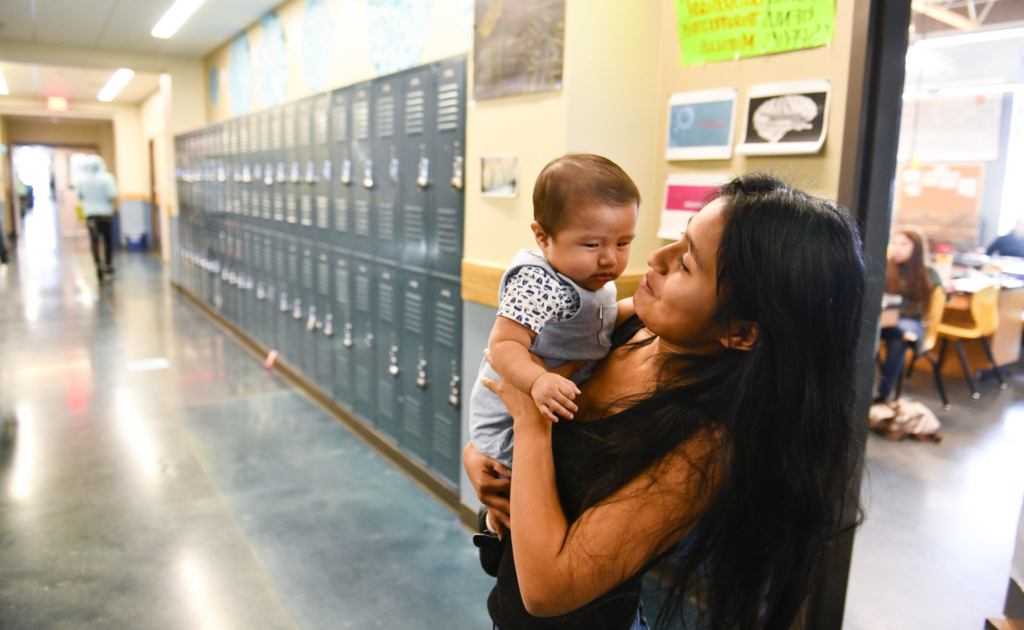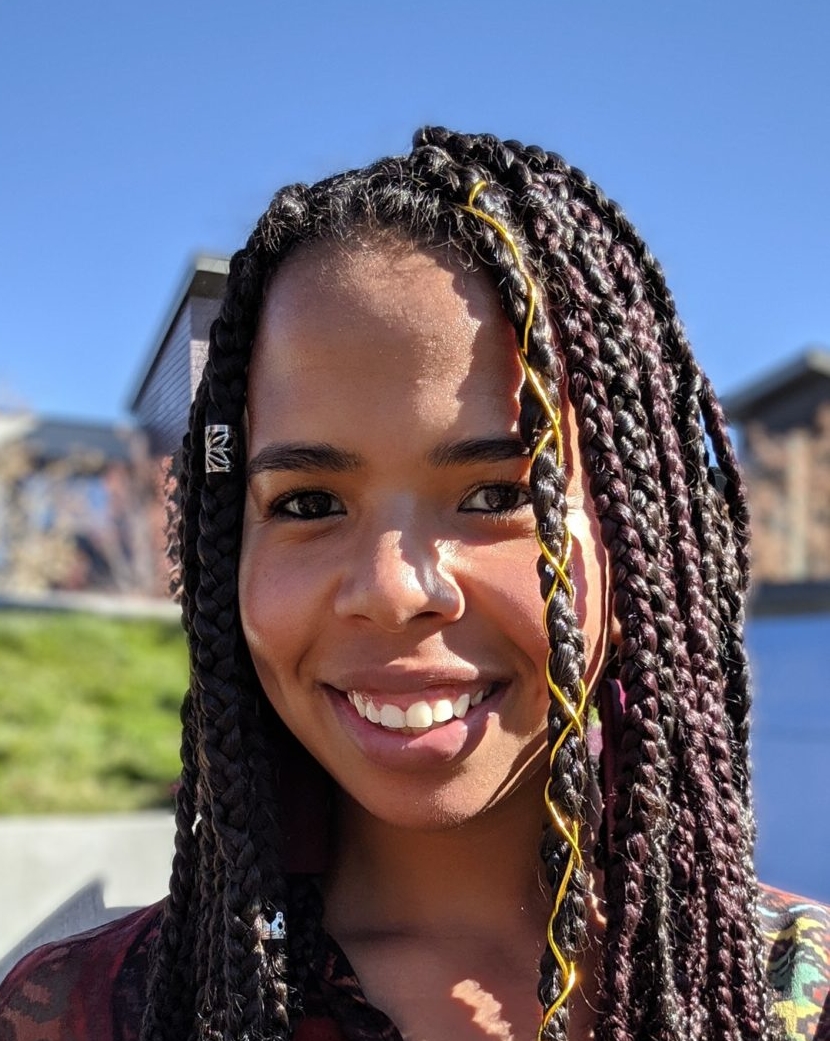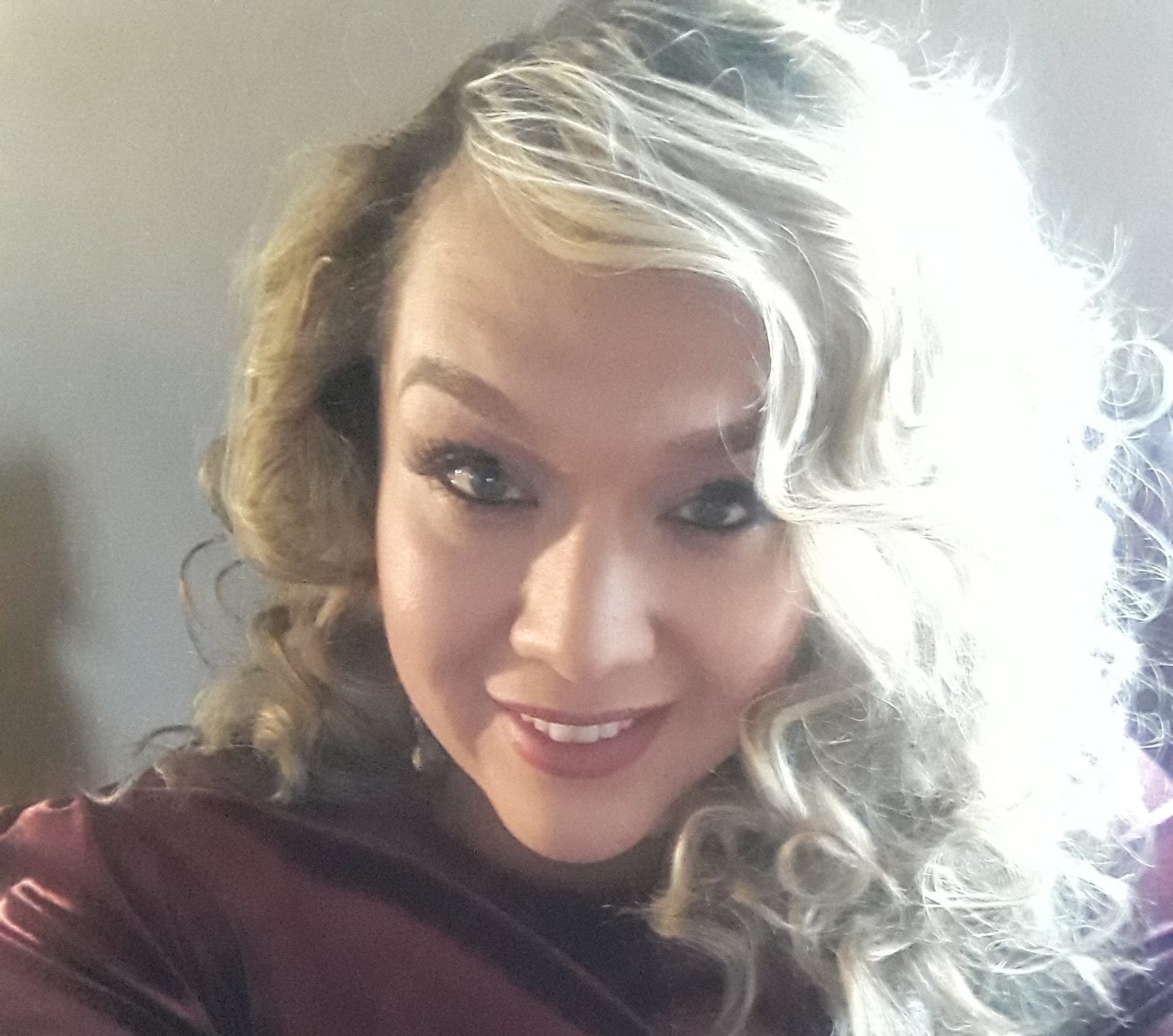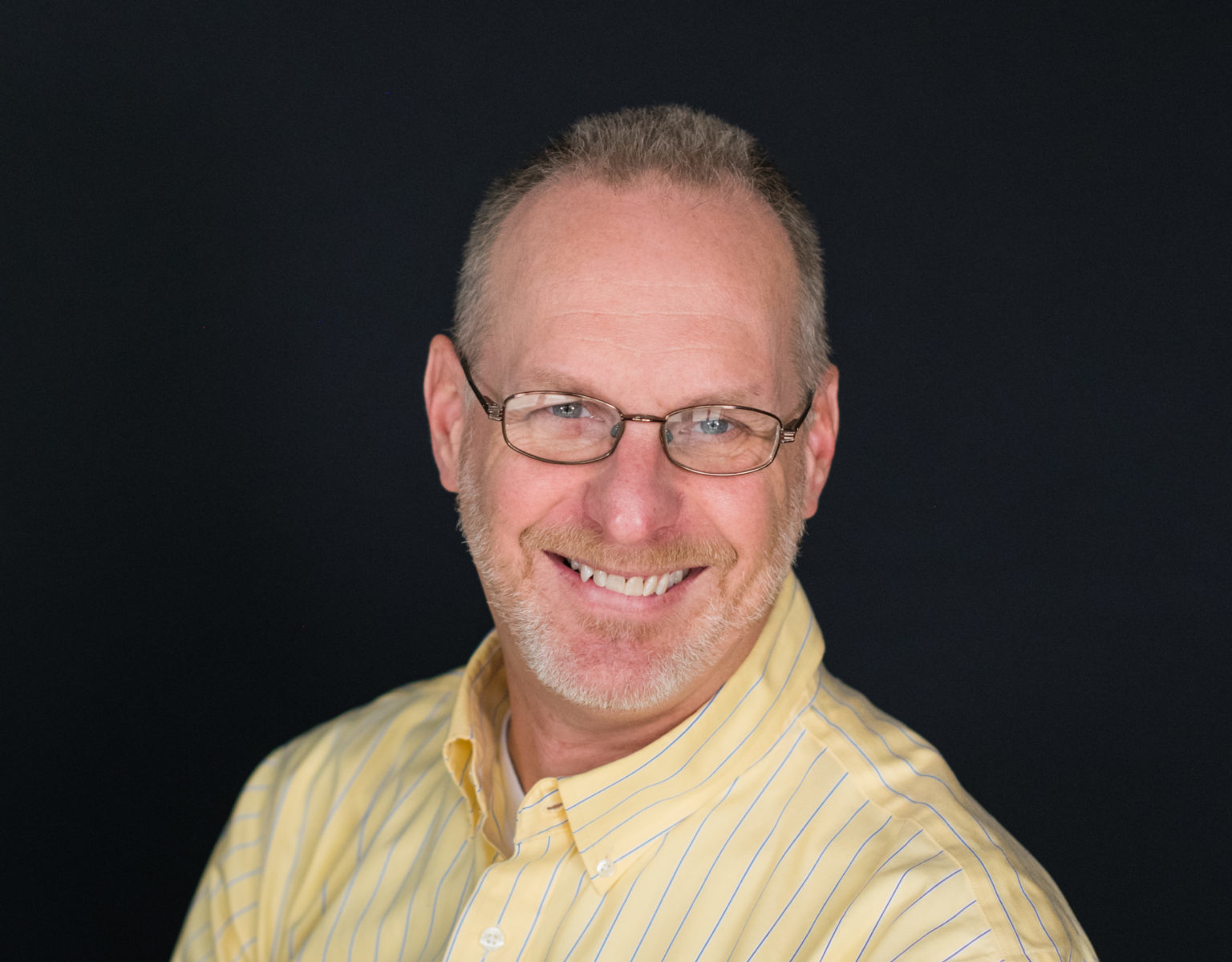We adjust and meet [our students] where they are as individuals, empowering them with this new level of assuredness that they won’t have to go about this journey alone.
Julie Reyes, Homebound Instructor and Advisor, New Legacy Charter School
New Legacy Charter School is a learner-centered environment in Aurora, Colorado that primarily serves pregnant and parenting teens. Their two-generation model provides learning opportunities for both teens and their children. We spoke with three of their leaders to learn more about their unique model—Chantal Rukundo-Karaara, Lead Toddler Teacher; Julie Reyes, Homebound Instructor and Advisor; and Steven Bartholomew, Executive Director.
Q: What is one thing you believe everyone should know and understand about the young people you serve at New Legacy Charter School?
Julie: Our students have big hearts, and they have ideas and goals they can achieve if they just have role models who are willing to coach them. Even though they’re young parents, they are also young adults who have their own dreams and their own visions for their future.
It’s awesome what New Legacy has been able to do in supporting these young adults. It has given us the tools to be their coaches and walk them through their journeys up until graduation.
Chantal: I would echo Julie’s sentiment. I think it’s so easy for young parents to get grouped into a stereotype and then feel tied to that stigma. For all of us who are privileged to work at New Legacy and for anyone who visits, we see how unique all of our students are. Our school brings that individuality out of them, even when they haven’t yet discovered it within themselves.
Thanks to our small size, staff and students form strong relationships with each other, which really gives our young parents an opportunity to come into their own as both a student and a parent. Because the “teen parent” stigma doesn’t exist at New Legacy, our students feel safe. It’s what allows them to flourish.
Steven: Teen parents are sadly looked at in a certain way. People assume they will drop out and won’t be successful. And, although dropout rates are certainly higher for teen parents, it’s not because of them. It’s because the current education system has put up so many roadblocks to their success. Teen parents have to choose between being a good parent and focusing on raising their child, and completing their high school education. Most places don’t let them do both.
New Legacy doesn’t force them to choose. They can be an amazing parent, while still getting their high school diploma. They can walk into the building, drop their child off at our award-winning early learning center, and come to the high school side for their own learning.
Julie: Building off of what Steven said, I think it’s awesome that students can have their child in the same building. For example, many of our students are encouraged to breastfeed, so having a space where the entire family can be in one building is crucial. In terms of building design, the hallway is divided into two, easily accessible sections, so the students can easily see their child when they need to, which includes having lunch with them every day. This open access to our early learning center is amazing.
Q: New Legacy also has non-parenting teens attend. What do you think attracts these young people to New Legacy?
Steven: Many of the students who aren’t parents are actually siblings of those who are parents. It’s kind of cool. I like to say we enroll families because we have parents, their children, and their aunts and uncles.
We also have students who just come to our school because we’re small and the environment feels safer for them. At the beginning of this year, we were giving a tour to an interested student who said she wanted to attend a school that was small, made her feel safe, and felt like a place where people would get to know her. New Legacy is that.
Lastly, we have students who have struggled academically and behaviorally at other schools due to the one-size-fits-all approach of conventional education. We’re able to individualize young people’s experiences and help them see the unique journey they can take.
Julie: New Legacy offers that family culture. One way we do that is by hosting family engagement events where we invite parents, grandparents, aunts, uncles—anybody who wants to join.
One of our most popular events is our multicultural festival. Our advisory groups get together to share a little bit about our individual family cultures, which includes food and music. It’s such a warm environment where families and the broader community can visit our school and get to know us a little bit better.
I think that’s one of the reasons why the non-parenting students join us. That welcoming feeling that a lot of bigger schools don’t offer—that family culture—is attractive and what they are looking for.
Chantal: Our location is also a big draw. For many of our families, transportation is an issue, and New Legacy is right next to a bus stop. And, since we are right on the border of Aurora and Denver, we are easily accessible for many students who live in neighboring districts. We’re also right by a major shopping mall, which is just another perk or convenience for students who need to take care of errands right after school.
It is also worth noting the building itself is beautiful and provides that extra feeling of safety.
Julie: Building on Chantal’s point, New Legacy also provides two free bus passes to our students each day. They don’t have to worry about how they’re going to pay for the bus or making it to the bus at a specific time each day. This is one more example of the kind of support we know is so important to provide our students.
Q: What are some of the unique supports provided for expecting and new mothers?
Julie: We work with WeeCycle and help students in need of diapers, wipes, and clothes. As a staff, we actually go pick up the items and bring them back to the school, so the students have one less chore they need to worry about. We have a binder where students can privately list what they need, which removes another barrier where they might not feel comfortable telling an adult directly.
Looking more broadly, when students are pregnant and they go on maternity leave, I coach them through the experience. We have a pregnancy group that meets twice a week, and we partner with Elephant Circle—a nonprofit organization that “offers coaching to leaders, families, and individuals to help them tackle whatever they are facing in the perinatal period.”
When students are on maternity leave, I deliver their academic work, help them with any questions, and ensure they and their baby are in good health. Additionally, we have two social workers who join me for home visits to better assess the mental health of our moms.
Even during this time of remote learning, the pregnancy groups have been really beneficial. We had two new students join our first group call, and they were super excited to ask all of the questions they had been wondering about. We talked about nutrition, the different stages of labor, natural birth, Braxton Hicks, and the overall journey of being a new mom. It was great seeing how engaged our students were.
Chantal: For young mothers and fathers whose children are a bit older, we have our early learning center, which serves families whose parents attend New Legacy or those from the broader community.
I’m a toddler teacher at New Legacy, and I design and create curriculum, lesson plans, and implement the Teaching Strategies GOLD®— our nationally recognized early childhood assessment and observations tool.
Our early learning support during remote learning has been focused on letting our families know we are still here. Every Tuesday and Thursday, we have virtual circle time for about 20 minutes where we sing songs, read books, and do show-and-tell. This gives us an opportunity to see if any of our families need extra support from us.
We are also providing family engagement activities that focus on different learning domains and milestones. We’ll design physical activities and activities focused on literacy, math, or science. The families will send us photos or videos of how the activities went.
Similar to Julie, I also provide perinatal support and, with one of our social workers, lead a pregnancy group. Before moving to remote learning, we would try to go off campus and walk around the community—maybe buy a snack from a bakery—so the expecting and new moms could simply talk about their experiences with others who were going through the same thing.
Q: When new mothers come back from maternity leave, what provides them the comfort and confidence to leave their newborn at the early learning center?
Chantal: It’s always hard leaving your child, no matter who you are or what your journey has been like, so one of the things we do before new mothers return to New Legacy is give them a chance to meet with their early learning center teacher. For students who were attending while pregnant, they get to do this before they go on maternity leave, so they get to build that relationship before their child is born.
I think that really helps with new parents’ journey back. Having open lines of communication during pregnancy and maternity leave, and when they are back at New Legacy, strengthens our relationships and is a unique point of access these parents wouldn’t even have at a regular childcare center.
Steven: Every parent has that natural worry when leaving their child for the first time at our early learning center. But, having that center in the same building they are tackling their own learning journey makes them realize, “Wait, I can do this. I can actually breathe and focus on my education because I know that my child is in such good hands.”
Q: What is one story or one aspect of New Legacy that makes you proud to work there?
Steven: One story that really sticks out happened at the state Capitol building. We had a student who testified in front of the Education Committee for the House of Representatives. The committee was reviewing legislation that would have hurt funding for charter schools.

She testified with her young son by her side, and the panelists were literally getting their phones out and taking pictures of the little boy while she was making her statements. After the testimony, they said, “We can’t pass this bill because it’s going to hurt her and her son.” As a result, the student received an advocacy award from the Colorado League of Charter Schools.
Chantal: We partner with Head Start and Mile High Early Learning, which enables us to access resources like speech therapy, physical therapy, and even dental hygienists—all of whom come directly to New Legacy to provide their services. Having these embedded into our structure allows parents to access services they might otherwise have to live without.
It’s really special to have a student in our early learning program receive occupational or emotional therapy with their parent right beside them, getting real-time updates on their progress. With everyone, including the New Legacy teacher, in the room together, there is a team of advocates who are deeply invested in the wellbeing of each family.
That’s something I’m really proud of. As an early learning teacher, I get to see that growth and development over the course of many years. It’s just wonderful.
Julie: We had a student, Maria, who enrolled in December of last year, and she’s a dual language learner. When she came in, she was super quiet and shy, but we bonded right away. She was pregnant when she enrolled, delivered her baby a few weeks later, and then was back at New Legacy where we helped her begin a once-a-week, off-campus English language course.
In such a short amount of time, watching her go from knowing zero words in English to being able to hold a conversation has been incredible. It’s just so empowering to see how much our students grow—emotionally and educationally.
Chantal: Maria is a great role model for our early learning center parents. Ever since she began her English learning journey, you can see how empowered she is. She comes in smiling every day, saying hi to everyone in her classroom. She’s a leader—helping other mothers with their breastfeeding journey and, in general, just being someone they can go to for advice.
Q: What would you say is the biggest impact New Legacy has on the futures of the young people you serve?
Julie: I think what lasts with our students is our willingness and ability to accommodate their needs. Our willingness to be so open with them is something they’ve never had access to. We adjust and meet them where they are as individuals, empowering them with this new level of assuredness that they won’t have to go about this journey alone.



